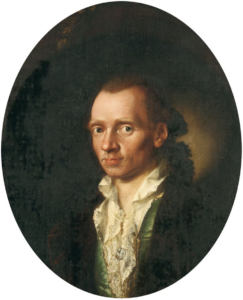Night music
(Poet's title: Nachtmusik)
Set by Schubert:
D 848
for TTBB quartet[July 1825]
Wir stimmen dir mit Flötensang,
In süßem Ton und Harfenklang
Ein nächtlich Lied der Freude!
Aus deiner Hülle tritt hervor,
Dass sich im stillen Abendflor
Dein Herz und Auge weide.
Komm, sieh, wie alles schläft und ruht,
Und unter Lunens sichrer Hut
Entweicht der Menschen Kummer.
Sieh, wie die Gegend vor uns liegt,
Als hättest du sie eingewiegt
In süßen Liebesschlummer!
O säume nicht, erhebe dich –
Schon wartet deiner wonniglich
Das ganze Heer der Sterne,
Denn guten Seelen sind sie hold
Und streuen ihnen funkelnd Gold
Aus der gewölbten Ferne.
Schließ an dich uns! Auf stiller Bahn
Weht dich kein falsches Lüftchen an,
Lass dich im Dunkeln grüßen!
Noch enger knüpft die Nacht das Band,
Wenn Freunde traulich, Hand in Hand
Sich an einander schließen.
Drum laden wir mit Flötensang
In süßem Ton und Harfenklang
Dich ein zu unsrer Freude,
Vereine dich mit unserm Chor,
Dass sich im nächtlich stillen Flor
Dein Herz und Auge weide.
We are raising our voices to you with the singing of the flute’s
Sweet notes and the sound of a harp,
A night song of joy!
Step forward out of your shelter,
So that in the quiet field of evening
Your heart and eyes can take pleasure.
Come, look at how everything is sleeping and resting,
And under Luna’s secure protection
Human concerns fade away.
Look at how the neighbourhood is lying before us
As if you had cradled it and lulled it
Into a sweet loving sleep!
Oh do not delay, raise yourself!
They are already waiting for you in bliss –
That whole host of stars:
For they are kind to good souls
And they strew their sparkling gold
Out of the vaulted distance.
Join with us! On quiet tracks
No evil breezes are going to blow on you.
Allow yourself to be greeted in the dark!
Night ties the connections even more tightly
When friends intimately, hand in hand,
Join together.
We therefore invite you with the singing of the flute’s
Sweet notes and the sound of a harp,
To come and join our joy;
Unite yourself with our choir,
So that in the quiet field of night
Your heart and eyes can take pleasure.
All translations into English that appear on this website, unless otherwise stated, are by Malcolm Wren. You are free to use them on condition that you acknowledge Malcolm Wren as the translator and schubertsong.uk as the source. Unless otherwise stated, the comments and essays that appear after the texts and translations are by Malcolm Wren and are © Copyright.
☙
Themes and images in this text:
Evening and the setting sun Friends Gold Harps and Aeolian harps Joy Night and the moon Serenades and songs at evening Stars
Karl Siegmund von Seckendorf (1744 – 1785) was a colleague of Goethe’s at the Weimar Court. He was active as a poet, translator and composer.
This serenade must have been written to encourage one of the more reticent members of the Dowager Duchess Amalia’s circle to join the others and come for a stroll around the gardens after dark. The poet contrasts the security of the protection offered by the moon with the less attractive shelter that the addressee of the poem is reluctant to leave.
☙
Original Spelling and note on the text Nachtmusik Wir stimmen dir mit Flötensang, In süßem Ton und Harfenklang, Ein nächtlich Lied der Freude ! Aus deiner Hülle tritt hervor, Daß sich im stillen Abendflor Dein Herz und Auge weide. Komm, sieh! wie alles schläft und ruht, Und unter Lunens sichrer Hut Entweicht der Menschen Kummer. Sieh, wie die Gegend vor uns liegt, Als hättest du sie eingewiegt, In süßen Liebesschlummer! O säume nicht, erhebe dich! Schon wartet deiner wonniglich Das ganze Heer der Sterne: Denn guten Seelen sind sie hold, Und streuen ihnen funkelnd Gold Aus der gewölbten Ferne. Schließ an dich uns! Auf stiller Bahn Weht dich kein falsches Lüftchen an. Laß dich im Dunkeln grüßen! Noch enger knüpft die Nacht das Band, Wenn Freunde traulich, Hand in Hand, Sich an einander schließen. Drum laden wir mit Flötensang, In süßem Ton und Harfenklang, Dich ein zu unsrer Freude; Vereine dich mit unserm Chor, Daß sich im nächtlich stillen Flor Dein Herz und Auge weide. 1 Schubert appears to have changed the original 'Lied, zur Freude' (song devoted to joy) to 'Lied der Freude' (joyful song)
Confirmed by Peter Rastl with Lyrische Anthologie. Herausgegeben von Friedrich Matthisson. Achter Theil. Zürich 1804. bey Orell Füssli und Compagnie, pages 109-110; and with Poetische Blumenlese Auf das Jahr 1780. Göttingen bey Johann Christian Dieterich, pages 144-145.
Schubert appears to have used the 1804 edition.
To see an early edition of the text, go to page 101 [107 von 282] here: http://digital.onb.ac.at/OnbViewer/viewer.faces?doc=ABO_%2BZ206602406


